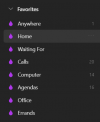Botany_Bill
Registered
I'm new to GTD, using a paper system.
I thought David (or the book) said to put all Next Actions in one place (separated by context, of course). But in a recent podcast, he said to manage NAs from emails in a NA folder in Outlook. I like that because it's easy to drop emails into folders. But it seems like this has 2 problems:
1) Emails from others are rarely written in a format that gets to the point of what _I_ need to do next.
2) This means I need to look through 2 separate NA lists, which feels wrong: I may miss something because my head could be in one list and not the other for a while.
So, should I not write all NAs from email into my paper NA list? How do any of you handle this?
Thank you!!
I thought David (or the book) said to put all Next Actions in one place (separated by context, of course). But in a recent podcast, he said to manage NAs from emails in a NA folder in Outlook. I like that because it's easy to drop emails into folders. But it seems like this has 2 problems:
1) Emails from others are rarely written in a format that gets to the point of what _I_ need to do next.
2) This means I need to look through 2 separate NA lists, which feels wrong: I may miss something because my head could be in one list and not the other for a while.
So, should I not write all NAs from email into my paper NA list? How do any of you handle this?
Thank you!!

